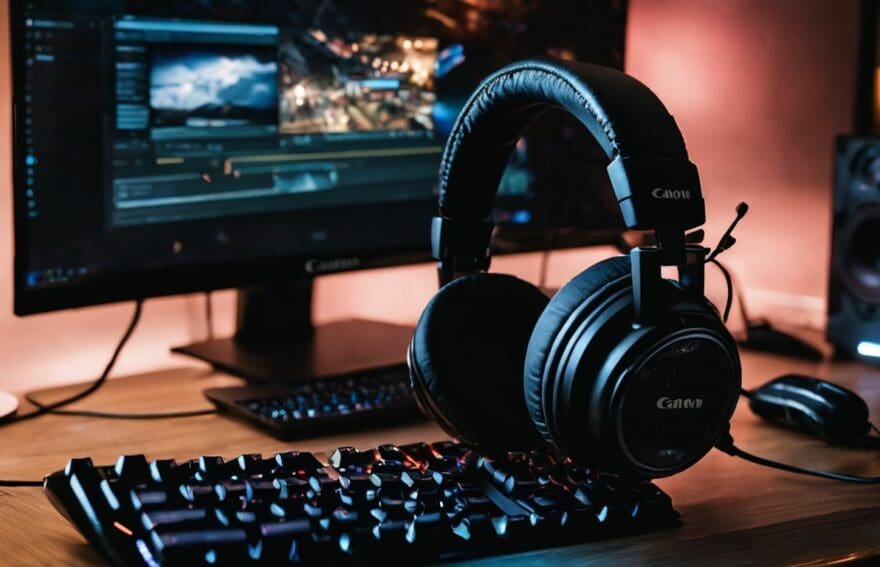Voice Communication Tools for Esports: Teamwork Makes the Dream Work

Updated On: November 13, 2025 by Aaron Connolly
Navigating the coordination of your esports team‘s tactics can be a bit like herding cats, but fear not; it’s a familiar challenge on the journey to triumph. As online gaming continues its meteoric rise and nattering over voice comms becomes essential, our comprehensive guide is brimming with tips and methods to hone your squad’s synergy through top-notch communication.
Delve into our resource for transformative advice that could very well tilt the scales in your favour!
The Impact of Voice Technology on Competitive Gaming
Improved coordination and communication through voice technology in competitive gaming has revolutionised team strategies, leading to enhanced gameplay and higher chances of victory.
These tools have become essential for effective teamwork and communication in the fast-paced world of esports.
Improved co-ordination and communication
Voice communication tools have revolutionised the way we play together in esports. They allow us to call out enemy positions, strategise on the fly, and make split-second decisions that can lead to victory.
By talking directly to our teammates, we build stronger social bonds and create a more immersive gaming experience.
We rely heavily on these tools for seamless co-ordination during intense matches. Clear instructions and quick updates keep everyone on the same page. This sharpens our overall team performance since being in sync is crucial for executing complex strategies effectively.
With every member hearing the same information at the same time, misunderstandings are less likely, fostering a unified approach to overcoming opponents.
Enhanced team strategies
Effective team strategies are crucial in the fast-paced world of esports. By leveraging voice communication tools, players can develop and execute enhanced strategies to outmaneuver their opponents.
Clear and concise communication empowers teams to coordinate their movements, time strategic plays, and adjust tactics on-the-fly for a competitive edge in gameplay.
Voice technology has transformed gaming experiences, creating new opportunities for teamwork and collaboration. Esports players rely on effective communication to adapt quickly to ever-changing game scenarios, anticipate enemy movements, and secure victories through coordinated team efforts.
Evaluating Teamwork and Communication in Esports
When evaluating teamwork and communication in esports, it’s essential to consider factors such as clear and concise communication, effective callouts, map awareness, and the ability to adapt to changing game situations.
These elements are crucial in achieving victory and maintaining a competitive edge in the world of esports.
Key factors to consider
- Role clarity: Clearly defining each player’s role within the team ensures effective coordination and minimises confusion during gameplay.
- Trust and respect: Building a foundation of trust and respect among teammates fosters open communication and a supportive environment for collaboration.
- Adaptability: Being adaptable to different gameplay scenarios and strategies enables teams to adjust quickly and work cohesively towards their common goal.
- Positive attitude: Maintaining a positive attitude, even in high-pressure situations, can uplift team morale and boost overall performance.
- Effective feedback: Providing constructive feedback and actively listening to teammates’ input promotes continuous improvement and enhances teamwork dynamics.
- Conflict resolution: Having clear protocols for resolving conflicts within the team ensures that any issues are addressed promptly, allowing focus to remain on gameplay.
Importance in achieving victory
Effective teamwork and communication are vital for achieving victory in esports. By utilising voice communication tools, players can coordinate their strategies, make split-second decisions, and adapt to the ever-changing dynamics of multiplayer gaming.
Voice technology has revolutionised the way gamers interact and collaborate with each other, enhancing their ability to work together as a cohesive unit.
In fast-paced environments like esports, good teamwork and communication skills can mean the difference between success and defeat. With effective use of voice communication tools, players can quickly relay information, execute efficient plays, and ultimately outmanoeuvre their opponents.
Tools for Communication in Esports
In-game communication systems and external voice communication tools such as Discord and TeamSpeak are crucial for effective teamwork in esports. These tools allow players to communicate in real-time, strategise, and coordinate their movements during competitive gaming.
In-game communication systems (voice and text chat)
- Voice Communication: Players can relay real-time information, coordinate strategies, and provide immediate feedback during gameplay.
- Text Chat: Enables players to communicate using written messages for those who prefer not to use voice chat or as an alternative means of communication.
- Social Interaction: In-game communication systems foster a sense of community among players and allow for casual conversations between matches.
- Coordination: Effective use of in-game communication tools helps in coordinating movements, calling out enemy positions, and organising team efforts during gameplay.
- Strategy Development: These systems facilitate the development of complex strategies, such as coordinating attacks, setting up defences, or planning ambushes within the game environment.
External voice communication tools (Discord, TeamSpeak, etc.)
- These tools offer customisable permissions to manage team roles and access levels, ensuring secure communication within the team.
- With easy-to-use interfaces, gamers can create their own servers, channels, and invite teammates to join with just a few clicks.
- Integrating Discord or TeamSpeak with in – game overlays allows players to seamlessly communicate without disrupting the gameplay.
- Furthermore, these platforms support file sharing and multimedia capabilities, making them versatile for both casual conversations and strategic discussions.
Tips for Effective Teamwork and Communication in Esports
– Effective communication is crucial in esports, so it’s essential to practise and maintain clear and concise communication with your team.
– Developing a shared vocabulary, using callouts, and maintaining map awareness are key components to enhancing teamwork and communication in gaming.
Practise and maintain effective communication
To improve your gaming communication skills, it’s essential to practise and maintain effective communication. This will not only enhance your gameplay but also contribute to the overall success of your team. Here are some tips to help you achieve this:
- Develop a clear and concise communication style to convey information quickly and accurately during gameplay.
- Actively listen to your teammates and respond promptly to their calls for support or coordination.
- Use positive reinforcement and encouragement to foster a collaborative and supportive team environment.
- Regularly review gameplay recordings with your team to identify areas for improvement and refine communication strategies.
- Engage in regular team training sessions focused on enhancing communication skills and teamwork dynamics.
- Utilise role – playing exercises to practise different communication scenarios that may arise during competitive gaming.
- Emphasise the importance of maintaining composure under high – pressure situations, ensuring effective communication even during intense moments.
Develop a shared vocabulary and code language
Creating a shared vocabulary and code language is crucial for effective communication among esports teams. This involves establishing common terms and callouts to convey information quickly and accurately during fast-paced gameplay.
By using consistent terminology, players can communicate more efficiently, increasing their ability to coordinate strategies and make split-second decisions. Developing a code language also helps in creating a sense of unity within the team, enhancing collaboration and teamwork on the virtual battlefield.
Esports teams can benefit from creating unique callouts or shorthand codes for specific in-game locations, enemy movements, or tactical manoeuvres. This practice not only streamlines communication but also minimises misunderstandings during intense gaming sessions.
Utilise callouts and map awareness
Utilising callouts and map awareness in esports is crucial for effective communication and strategic gameplay. When playing team-based games, players should use callouts to verbally identify the location of opponents or important objectives, allowing teammates to respond accordingly.
Utilising map awareness involves constantly monitoring the in-game map to track enemy movement and plan strategic positioning. Effective use of these tools can significantly enhance teamwork and coordination, leading to a competitive advantage in esports competitions.
Incorporating callouts and map awareness into your gaming strategy enables seamless communication with your team, ensuring that everyone is on the same page when it comes to tactics and decision-making.
Shifting the Metagame: The Future of Esports Communication
Leveraging the power of voice communication in esports can revolutionise team-based gaming, incorporating AI and voice recognition technology to create seamless communication. The potential for advancements in this area could redefine how teams collaborate and strategise in competitive gaming.
Leveraging the power of voice communication
Voice communication is a game-changer in esports, revolutionising the way teams strategise and coordinate. With the integration of voice technology, players can seamlessly communicate complex plans and execute strategies with precision.
This not only enhances team efficiency but also creates a more immersive gaming experience. The use of effective communication tools such as Discord or TeamSpeak facilitates real-time coordination, enabling players to adapt swiftly to dynamic in-game scenarios.
As online gaming continues to surge in popularity, leveraging the power of voice communication becomes paramount for achieving victory and fostering strong teamwork within esports.
Incorporating AI and voice recognition technology
Incorporating AI and voice recognition technology can revolutionise the world of esports communication. With AI-powered features, such as natural language processing and sentiment analysis, team members can experience more seamless and intuitive interactions during gameplay.
Integrating voice recognition technology allows for hands-free commands, improving players‘ ability to coordinate strategies effectively and focus on the game at hand.
Utilising AI and voice recognition technology in gaming not only streamlines communication but also enhances the overall immersive experience for gamers. These advancements have the potential to optimise teamwork by providing real-time translations for international teams, creating a more inclusive environment within the esports community.
The potential for seamless communication in team-based games
Voice communication tools have revolutionised the way teams collaborate in team-based games. With the integration of advanced voice recognition technology, esports players can now seamlessly communicate and strategise in fast-paced, high-stakes environments.
The use of external voice communication tools like Discord and TeamSpeak has further enhanced teamwork, allowing for quick coordination and effective decision-making during gameplay.
In online gaming, effective communication is crucial for success. By leveraging the power of voice communication, gamers can build stronger social bonds, share real-time information, and create better strategies to outmaneuver opponents.
Conclusion
In conclusion, effective communication is the cornerstone of success in esports. The right voice communication tools and strategies can significantly enhance teamwork and coordination among players.
As technology continues to advance, the future holds exciting possibilities for seamless and immersive team-based gaming experiences. Embracing these tools and techniques will undoubtedly help esports teams reach new heights in competitive gaming.
FAQs
1. What are voice communication tools for esports?
Voice communication tools for esports are apps that allow players to talk and strategise together in real time during gaming, making teamwork seamless.
2. How do team communication tools help in esports?
Team communication tools enhance effective teamwork by providing clear voice technology for gamers to coordinate strategies and collaborate better while playing.
3. Can group chat apps be used effectively by remote teams in esports?
Absolutely! Group chat apps offer a platform for remote team communication, allowing esports players to connect and discuss tactics no matter where they are.
4. Why is collaboration important using voice communication in gaming teams?
Effective communication through collaborative tools is key to successful teamwork in gaming because it helps with laying out team strategies and ensuring all players understand their roles.
5. Are business communication tools similar to those used in online gaming communities?
Yes, many of the features found in business communications such as group chats or video calls also apply to online gaming community platforms, fostering better collaboration and team strategy discussions within the esports environment.


